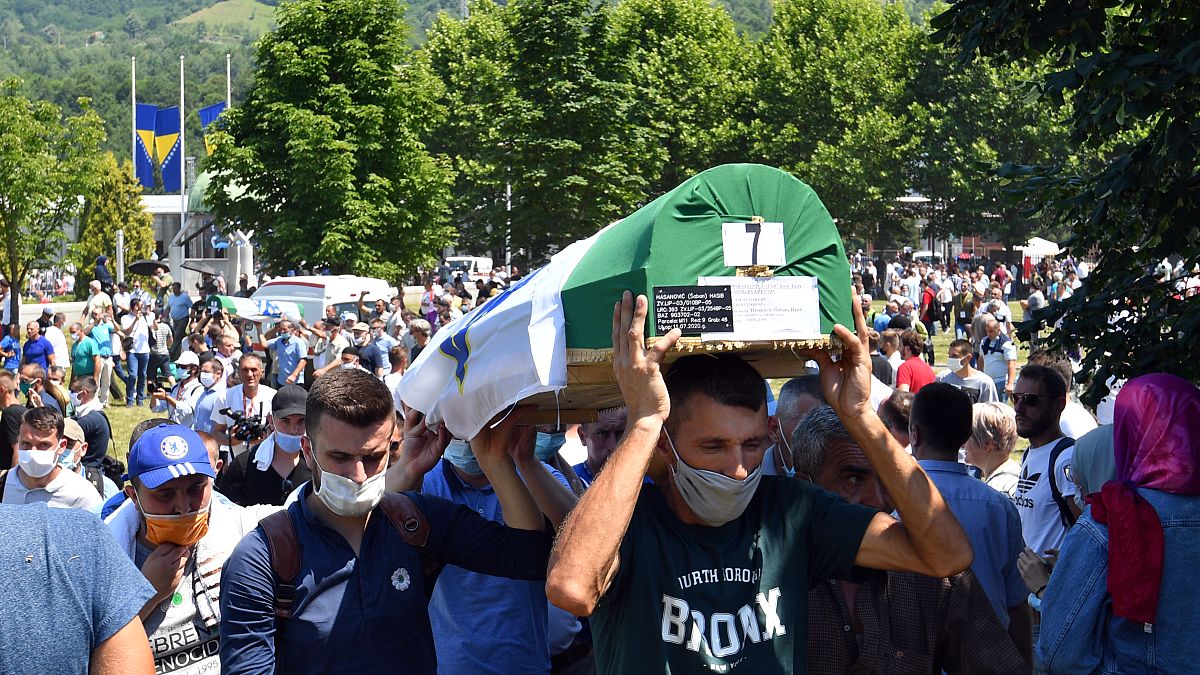In the 25 years since the Srebrenica massacre, some Serb leaders haven't fully accepted responsibility and deny that genocide took place in Bosnia in 1995.
Amid the calls for tolerance and reconciliation as the world marks the 25th anniversary of Srebrenica, some speakers at commemorations on Saturday went further in demanding that Serbian leaders fully accept responsibility for the 1995 massacre that was part of a genocide against Muslims during the Bosnian War.
European Commission president, Ursula von der Leyen, UN Secretary-General Antonio Guterres and the British, Dutch and Spanish prime ministers were among several senior figures to send video messages to the event, scaled down this year due to coronavirus restrictions.
“Reconciliation means rejecting denial of genocide and war crimes and of any effort to glorify convicted war criminals,” Guterres said in his address.
Šefik Džaferović, the Bosniak Muslim member of Bosnia’s tripartite presidency, called for more from world leaders in the face of attempts to downplay, relativise or deny what happened.
"I am calling on our friends from around the world to show, not just with words but also with actions, that they will not accept the denial of genocide and celebration of its perpetrators," he said.
"The Srebrenica genocide is being denied [by Serb leaders] just as systematically and meticulously as it was executed in 1995… we owe it not just to Srebrenica, but to humanity, to oppose that," he added.
A similar call came from Bakir Izetbegović, head of the Party of Democratic Action (SDA), the main Muslim Bosniak political party. "The international community did not defend Srebrenica 25 years ago, but it has the possibility to defend the truth which is called into question," he said.
Bosnia is still ethnically divided a quarter of a century after the brutal execution in July 1995 of more than 8,000 Bosniak Muslim men and boys, who were singled out and murdered over 10 days by Bosnian Serb forces. In a pre-planned operation, many were taken away in buses to be executed; bulldozers were used to push them into mass graves in the forest.
Bosnian Serbs, however, still celebrate their wartime leaders Radovan Karadzic and Ratko Mladic - later convicted and sentenced for genocide by a UN war crimes tribunal - as heroes. Some are even staging celebrations of "the 1995 liberation of Srebrenica" on the anniversary of the crime.
Serbia has apologised for the massacre but has not accepted the widespread international interpretation that it was genocide.
At the time, the expulsion of the mostly Muslim Bosniak people - in what was termed "ethnic cleansing" - was part of an attempt to create a "Greater Serbia." Today, some of Serbia's leaders are accused of complicity in, or actively engaging in, genocide denial.
One such figure is Milorad Dodik, the Serb member of the tripartite Bosnian Presidency. Last year, he called the Srebrenica massacre "a fabricated myth."
In an opinion piece for Euronews, academic and author Edina Becirevic says he has the open support of Serbian president Alexsandar Vučić, despite his renewed promotion of ethno-nationalism, and calls on the European Union to take a stronger stand.
"It is unsurprising... that Dodik has good relations with leaders like Putin and Orban. But it is problematic that he is treated as a legitimate partner by many European diplomats as well," she writes. "The EU must recognise that opportunities to pressure Bosnian Serb and Serbian leaders to treat history objectively should not be wasted."
Another prominent figure who denies that genocide happened at Srebrenica is the town's mayor. Mladen Grijicic has repeatedly peddled theories, popular among Serbian politicians and media, alleging that the crime has been exaggerated.
"Every day there is new proof which deny the current presentation of all that happened" at Srebrenica, AFP quoted him as saying.
In fact, the evidence of the slaughter carried out by the Bosnian Serbs in 1995 was overwhelming and gathered in meticulous detail, leading Bosnian and international courts to rule that it was genocide.
But 25 years after the fighting ended in the former Yugoslavia, the battle to shape the memory of what happened is still raging.
